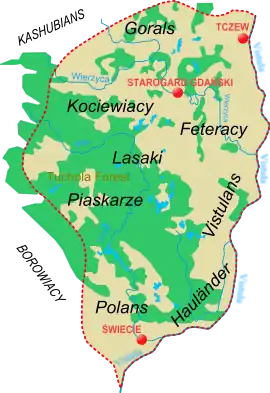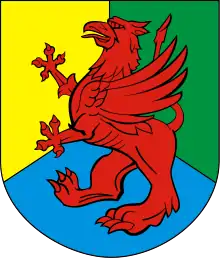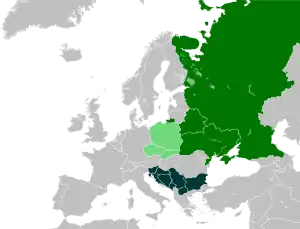Kociewie
Kociewie | |
|---|---|
Ethnocultural region | |
 Flag | |
 | |
| Countries | Poland |
| Largest cities | Starogard Gdański, Tczew, Świecie, Pelplin (Traditional capital) |
| Demonym | Pomeranian |
| Time zone | UTC+1 (CET) |
| • Summer (DST) | UTC+2 (CEST) |
Kociewie is an ethnocultural region in the eastern part of Tuchola Forest, in northern Poland, Pomerania, south of Gdańsk. Its cultural capital is Starogard Gdański, the biggest town is Tczew, while other major towns include Świecie, Pelplin, and Skórcz. The region has about 250,000 inhabitants. It has well-developed industry and agriculture.
Kociewians
The Kociewians are a Polish[1] ethnographical group. Most of the Kociewiacy are Roman Catholics. They live next to a far more prominent ethnic group in the area, the Kashubians. In the 2011 census, 3065 individuals declared themselves as Kociewiacy (3053 combined this identification with Polish identification – they stated that they were Polish, but emphasized their Kociewie region), an increase since the census of 2002, when nobody identified as such.[2] The Kocievian dialect, unlike Kashubian, is mostly intelligible with mainstream Polish language. Despite geographic proximity, these two dialects are very dissimilar, with Kocievian being much closer to Kuyavian, to the point of some scholars calling it a variant of that dialect.[3]
The IETF language tags have assigned the variant pl-kociewie to the Kociewie dialect of Polish.[4]
Culture
National events
World Kociewie Day (Światowy Dzień Kociewia) is an annual celebration taking place on 10 February. The date is commemorated as the first known mention of Kociewia in the historical record.[5]
Various towns across the region also hold independent celebrations of Kociewian culture including the annual Kociewian Day (Dzień Kociewski) held in Nowe[6] and the Festival of Kociewie (Święto Kociewia) which takes place annually in Tczew.[7][8]

The Kociewian Congress (Kongres Kociewski) is a periodic event held since 1995 which takes place in Tczew.[9] At the sixth Congress in 2022 a competition to design a national flag was announced.[10]
In 2023 the first joint Kashubian-Kociewian Congress of Self-Government was instituted. The Congress took place on 22 July in Wejherowo and invited guests included the then Polish prime minister Mateusz Morawiecki.[11]
Institutions
The city of Starogard Gdański is home to the Museum of the Kociewian Lands (Muzeum Ziemi Kociewskiej) which displays historical and ethnographic exhibits related to the region. The museum has a research library and hosts regular educational and cultural events.[12]
The Centre of Kociewian Culture (Centrum Kultury Kociewskiej), located in Lalkowy, focuses on the industrial and agricultural heritage of the region.[13]
The Museum of the History of the Polish Peasant Movement (Muzeum Historii Polskiego Ruchu Ludowego) in Piaseczno houses a collection of agricultural artefacts from the Kociewian region.[14]

Music
The Festival of Kociewian Folk is an annual music event which takes place in Piaseczno.[15]
Sports
The ethnocultural identity of Kociewia has been adopted by various football teams including KP Starogard Gdański, Unia Tczew, and Wisła Tczew all of which have taken on the moniker Duma Kociewia (Pride of Kociewia) as club nicknames. The basketball club SKS Starogard Gdański has the nickname Kociewskie diabły (Kociewian Devils) and the now defunct sports association KS Agro-Kociewie Starogard Gdański incorporated the region's identity into their club name.[16]
Traditions
Pultrowanie is a common custom whereby neighbours and guests will smash glass on the doorstep of the bride’s house the evening before her wedding.[17]
Genetics
In a 2013 study, Y-DNA haplogroups among the Polish population indigenous to Kociewie (n=158) were reported as follows:
56.3% R1a, 17.7% R1b, 8.2% I1, 7.6% I2, 3.8% E1b1b, 1.9% N1, 1.9% J and 2% of other haplogroups.[18]
See also
References
- ↑ Główny Urząd Statystyczny (January 2013). Ludność. Stan i struktura demograficzno-społeczna [Narodowy Spis Powszechny Ludności i Mieszkań 2011] (pdf) (in Polish). Główny Urząd Statystyczny. Retrieved 12 December 2014.
- ↑ Gudaszewski, Grzegorz (November 2015). Struktura narodowo-etniczna, językowa i wyznaniowa ludności Polski. Narodowy Spis Powszechny Ludności i Mieszkań 2011 (PDF). Warsaw: Główny Urząd Statystyczny. pp. 132–137. ISBN 978-83-7027-597-6.
- ↑ Fischer, Adam (1926). Lud polski – podręcznik etnografji Polski (in Polish). Lwów, Warszawa, Kraków: Wydawnictwo Zakładu Narodowego im. Ossolińskich.
- ↑ "IETF language subtag registry". IANA. 2021-08-06. Retrieved 10 September 2021.
- ↑ "Co roku 10 lutego obchodzimy Światowy Dzień Kociewia". Pomorskie.eu (in Polish). 2022. Retrieved 31 December 2023.
- ↑ "Centrum Kultury "Zamek" » Dzień Kociewski 2008". Biuletyn Informacji Publicznej: Gmina Nowe (in Polish). Retrieved 31 December 2023.
- ↑ "Kociewski akcent na Jarmarku św. Dominika". Powiat Tczewski (in Polish). 2021. Retrieved 31 December 2023.
- ↑ "Tczew: Święto Kociewia już 4 sierpnia!". Serwis Samorządowy (in Polish). 2023. Retrieved 31 December 2023.
- ↑ "Kociewie. IV Kongres Kociewski – propozycje referatów, panelistów i gości". BP Tczew (in Polish). Retrieved 31 December 2023.
- ↑ Paszkowska, Krystyna (2022). "Koncert „Jak skała na morzu! O Polskości Pomorza" na finał 6. Kongresu Kociewskiego". Zawsze Pomorze (in Polish). Retrieved 31 December 2023.
- ↑ Kamasz, Łukasz (2023). "O rozwoju Kaszub i Kociewa. I Kaszubsko-Kociewski Kongres Samorządowy – "Rozwój Pomorza" już w sobotę 22 lipca!". Sopot naszemiast (in Polish). Retrieved 31 December 2023.
- ↑ "Witamy na stronach Muzeum Ziemi Kociewskiej w Starogardzie Gdańskim". MUZEUM ZIEMI KOCIEWSKIEJ (in Polish). Retrieved 31 December 2023.
- ↑ "CENTRUM KULTURY KOCIEWSKIEJ LALKOWY". Kociewie 24 (in Polish). Retrieved 31 December 2023.
- ↑ Wachowska, Bogdana (2021). "Tak rodziła się spółdzielczość". Zawsze Pomorze (in Polish). Retrieved 31 December 2023.
- ↑ Staniszewski, Jakub (2022). "Piaseczno Folklor Festiwal 2022 już 27 sierpnia!". Tczew naszemiasto (in Polish). Retrieved 31 December 2023.
- ↑ Jędrzyński, M; Kłos, W (2011). "Likwidacja klubu Agro-Kociewie". Starogard Gdański naszemiasto (in Polish). Retrieved 31 December 2023.
- ↑ Kotłowska, Regina. "SŁOWNIK GWARY KOCIEWSKIEJ". Kociewie 24 (in Polish). Retrieved 31 December 2023.
- ↑ Rebala, K.; et al. (April 2013). "Contemporary paternal genetic landscape of Polish and German populations: from early medieval Slavic expansion to post-World War II resettlements". European Journal of Human Genetics. 21 (4). Figure 1. doi:10.1038/ejhg.2012.190. PMC 3598329. PMID 22968131.

